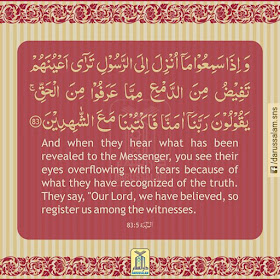Condition of the Faith of True Believers
Within the Qur'anic discourse, the
people whose faith in Islam is the result of intellectual and audition based
faiths are termed siddiqeen (singular siddeeq). The major characteristic of siddiqeen, which distinguishes them from other
believers, is that they leap forward to accept a prophet’s call without a moment’s
hesitation. They are likened to the believer who, after performing wudu` (ritual purity), impatiently waits
for the prayer-call and the moment the call is sounded scurries to the masjid. Among the siddiqeen, the personality of Abu Bakr (RAA) is prominent about whom the
Prophet (SAW) said: whosoever I invited to Islam took some time to accept it
except Abu Bakr (RAA), who did not hesitate even for a moment. It is for this
reason that Abu Bakr (RAA) is called “al-siddeeq al-akbar” (The Greatest siddeeq i.e. testifier).
We must ponder why this was so? It was
because Abu Bakr (RAA) had no difficulty in accepting the Prophet’s (SAW) call,
for the call was nothing more than a reverberation of Abu Bakr’s (RAA) own
thoughts and beliefs that he had come to accept having traversed the process of
iman-e-`aqli.
Abu Bakr
(RAA) was not the lone case however. In that land of vulgar paganism and
polytheism, a land sunk deep in the darkness of ignorance and backwardness,
there were individuals whose hearts were illumined with the light of tauheed (Unity of God) and whose inner nature
was pure and pristine. Among them, as stated above, was Abu Bakr (RAA) who had
never associated gods with Allah (SWT); just as the Prophet (SAW), Abu Bakr
(RAA) was also a follower of tauheed from day one.
Same was the case with Uthman bin `Affan (RAA) and Sa`eed bin Zaid (RAA), both of whom were among the ten companions given the glad-tidings of Paradise in their lifetime. In this very land lived the father of Sa`eed bin Zaid (RAA), named Zaid bin ‘Amr bin Nufail – who died before the revelation descended upon Prophet Muhammad (SAW) – about whom it is known that he used to supplicate while clinging to the drapes of Ka’bah: “My Lord! I want to worship You alone. I proclaim my disassociation with all these false-gods that the people of Makkah worship. I want to worship none except You, but do not know how!”
In this very land once roamed a man by the name of Waraqah bin Naufil who renounced paganism and sought to discover the True Reality of life. His search took him to Syria where he learned the Hebrew language and converted to Christianity. At the time when the first revelation descended upon the Prophet (SAW), his (SAW) wife Khadijah (RAA) took the Prophet (SAW) to Waraqah. Waraqah confirmed that the man who appeared to the Prophet (SAW) was the same angel who had descended upon Musa (AS) and Isa (AS). He further informed the Prophet (SAW) that he wished to live to see the day when the people of Makkah would force him (SAW) out of the city so that he can help him (SAW). However, he died soon thereafter.
In summation, the siddiqeen are characterized by sound intellect and pristine pure nature; people whose iman is the result of both iman-e-a`qli and iman-e-sam`ee. The Qur’an mentions them in another place:
Same was the case with Uthman bin `Affan (RAA) and Sa`eed bin Zaid (RAA), both of whom were among the ten companions given the glad-tidings of Paradise in their lifetime. In this very land lived the father of Sa`eed bin Zaid (RAA), named Zaid bin ‘Amr bin Nufail – who died before the revelation descended upon Prophet Muhammad (SAW) – about whom it is known that he used to supplicate while clinging to the drapes of Ka’bah: “My Lord! I want to worship You alone. I proclaim my disassociation with all these false-gods that the people of Makkah worship. I want to worship none except You, but do not know how!”
In this very land once roamed a man by the name of Waraqah bin Naufil who renounced paganism and sought to discover the True Reality of life. His search took him to Syria where he learned the Hebrew language and converted to Christianity. At the time when the first revelation descended upon the Prophet (SAW), his (SAW) wife Khadijah (RAA) took the Prophet (SAW) to Waraqah. Waraqah confirmed that the man who appeared to the Prophet (SAW) was the same angel who had descended upon Musa (AS) and Isa (AS). He further informed the Prophet (SAW) that he wished to live to see the day when the people of Makkah would force him (SAW) out of the city so that he can help him (SAW). However, he died soon thereafter.
In summation, the siddiqeen are characterized by sound intellect and pristine pure nature; people whose iman is the result of both iman-e-a`qli and iman-e-sam`ee. The Qur’an mentions them in another place:
“And when they listen to the
revelation received by the prophet you will see their eyes overflowing with tears
for they recognize the truth: they pray: ‘Our Lord! We believe! Write us down
among the witnesses.’”
[al-Qur’an
5:83]
The especial regard for the siddiqeen by All ah (SWT) is evident from the
fact that their supplication (ayahs 192-194) mentioned above is promptly responded to by their Lord
(SWT):
“And their Lord has accepted of
them and answered them (their prayers): ‘Never will I suffer to be lost the work
of any of you be he male or female: You are members one of another (equal to
one another).”
[al-Qur’an
3:195]




No comments:
Post a Comment